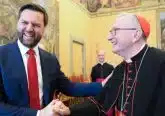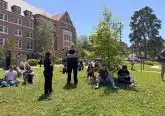Marriage ruling said to leave unanswered questions for religious groups

IMAGE: CNS photo/Joshua Roberts, Reuters
By Angela Cave
NEW YORK (CNS) — There are still unanswered questions about the legal implications of June’s Supreme Court same-sex marriage ruling, but analysts agree religious institutions face big challenges in the months and years to come.
The landmark decision in Obergefell v. Hodges won’t just ensure that states cannot deny marriage licenses to same-sex couples, said John Breen, a law professor at Loyola University Chicago. It could also have a ripple effect on the tax-exempt statuses of religious organizations; the rights of business owners to deny services based on religious beliefs; the ability of religious colleges to deny married student housing benefits; the right of religious organizations to hire for mission; the participation of ministers in civil marriages; the right of religious adoption agencies to decline to place children with same-sex couples; and much more.
“It’s not the end; it’s the beginning,” Breen told Catholic News Service. “It will be pushed further. I have no doubt that all of these challenges are coming.”
The Catholic Church teaches that marriage is between a man and a woman and that sex outside marriage is a sin. At the same time the church upholds the human dignity of all people.
At the time of the decision, in which a divided court found in the 14th Amendment a fundamental right for same-sex couples to marry, Catholic bishops in dioceses and archdioceses throughout the nation responded with great disappointment. They objected to the court’s ability to define marriage and denounced what they believe will be “a long-term corrosive effect on the institution of marriage,” which they call a “well-established and divinely revealed covenant between one man and one woman.”
Archbishop Joseph E. Kurtz of Louisville, Kentucky, president of the U.S. bishops’ conference, called the marriage ruling “a tragic error” and he urged Catholics to move forward with faith “in the unchanging truth about marriage being between one man and one woman.”
He called it “profoundly immoral and unjust for the government to declare that two people of the same sex can constitute a marriage.”
At their annual meeting in November, as a way to move forward in response to the court’s ruling, the U.S. bishops announced a pastoral plan on marriage and family to help married couples keep their relationships strong and encourage young Catholics to marry in the church.
Archbishop William E. Lori of Baltimore, chairman of the U.S. bishops’ Ad Hoc Committee for Religious Liberty, said the decision’s acknowledgment of religious liberty is too narrow. “(It) recognizes free speech, the right of religion to teach or advocate with regard to the true definition of marriage, but it does not acknowledge (that) the First Amendment also protects freedom of religion and the right to follow our teaching,” he said. “(There is a) difficult road ahead for people of faith.”
Breen, who has a law degree from Harvard and has spoken on panels since the decision, said proponents of traditional marriage “will be made cultural pariah.”
“It’s really about power (and) making a group of dissenters comply,” he said of Obergefell. “(It) neuters them, frankly, so there’s a naked public square. We won’t have a pluralism anymore; we’ll have a hegemony. Under the banner of tolerance, it’s intolerant.”
There’s already a movement to withdraw or deny accreditation for religiously affiliated colleges if they refuse benefits to same-sex married couples, Breen said, theorizing that Catholic colleges might form their own accrediting bodies in the future. They’ll “undoubtedly” be challenged, sued and fined for countercultural policies, he told CNS.
Even publicly declaring opposition to same-sex marriage could put Catholic organizations like colleges at risk, added Daniel Mark, a law professor at Villanova University in Pennsylvania. The 1983 Supreme Court decision in Bob Jones University v. United States enabled the IRS to revoke the tax-exempt status of a religious university whose policies are contrary to a compelling government public policy, such as eradicating racial discrimination.
“This is the obvious place where this is going,” Mark said. “I think we should expect very direct challenges in the courts. It could happen quite soon. Religious institutions are very dependent on this significant monetary benefit. If they lose that, I think a lot of institutions will go under.”
More potential issues in the educational sphere, according to Breen, include public schools and universities banning student clubs that support traditional marriage; an aggressive application of student speech codes that would bring up traditional marriage supporters on hate speech charges; and mandatory education on the validity of same-sex marriage in public schools and even in homeschooling curriculum.
Breen and Mark say the government can’t compel a Catholic priest to celebrate the sacrament of marriage for a same-sex couple, but it’s only a matter of time before the first lawsuit is filed against a parish that refuses to rent out its church for a civil ceremony.
“There’s a real concern here when that challenge comes,” said Mark, who has a doctorate from Princeton. “I don’t think it will be easily won,” especially if a parishioner is asking. Parishes could feel forced to comply “if it’s a question of being bankrupted. The process is the punishment.”
The next question is, “To what extent should the church withdraw from the civil marriage business altogether?” Mark asked, adding that there’s also a movement pushing for priests to give up their status as agents of the state. And there’s talk of priests voluntarily doing so.
“That would be a big loss,” Mark said. “The witness of the church to the truth about marriage is absolutely critical for the church and for the world.”
Something like a Knights of Columbus Hall may be compelled by state public accommodation laws to provide space for receptions. Businesses such as those owned by photographers, florists, bakers and caterers have already been challenged in the courts.
“The idea is if you’re open for business, you’re open for business,” Breen said. “We’re in a cultural movement where LGBT rights are in the ascendency, so they’re going to be protected maybe in a way that comes before other rights. It remains to be seen.” LGBT is the acronym for lesbian, gay, bisexual and transgender.
Mark said businesses “should be free to act according to their conscience, (but) so far, the law is not on our side. I think we can make this work, but it will depend on how aggressive the litigation is.”
The ongoing lawsuits against the federal Health and Human Services birth control mandate could inform future conscience protections for same-sex marriage, the professors said. A victory for Catholic plaintiffs — most notably the Little Sisters of the Poor and other Catholic plaintiffs whose mandate appeals cases the Supreme Court has agreed to hear in the spring — may even drum up public support for the House’s First Amendment Defense Act, which would prevent federal agencies from denying a tax exemption, grant, contract, license or certification to an individual, association or business based on their support for traditional marriage.
But the experts aren’t sure the bill has legs. “I don’t see the president signing this into law,” Breen said. “He’s not a friend of religious liberty. A lot’s riding on the current cases.
“We live in a less religious society than we did a generation ago,” Breen continued. “As a result of that, religious liberty is less valued. It will be harder to make the argument.”
Further, Breen and Mark say belonging to Catholic organizations will take more courage in the future.
“There’s no promise that faithfulness comes without hardship,” Mark said. The perspective of same-sex marriage supporters “is to do with this what we did with racism: to create such a strong social stigma that it drives it into extinction. The fight we should be having is a fight of democracy. … The Supreme Court should have said, ‘We appreciate your concern, but the Constitution does not provide an answer for this question.”
– – –
Copyright © 2016 Catholic News Service/U.S. Conference of Catholic Bishops. www.catholicnews.com. All rights reserved. Republishing or redistributing of CNS content, including by framing or similar means without prior permission, is prohibited. You may link to stories on our public site. This copy is for your personal, non-commercial use only. To request permission for republishing or redistributing of CNS content, please contact permissions at [email protected].













